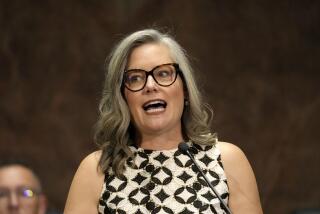Bill to Ease Hatch Act’s Political Curbs Vetoed : Legislation: Aides say Bush will also reject a measure to grant workers unpaid family leaves. Overrides are unlikely.
- Share via
WASHINGTON — President Bush vetoed a measure Friday that would allow federal workers to take a more active role in partisan politics, and aides repeated his pledge to veto a bill that would guarantee workers the right to take unpaid family or medical leaves.
Congress, which has not yet overturned a Bush veto, appears unlikely to be able to override in either case. But Democrats hope both vetoes--Bush’s 12th and 13th so far--will provide them with workable campaign issues during this fall’s elections.
The federal workers bill would amend the Hatch Act, the law that bars government employees from taking part in almost any partisan activity beyond merely voting. Changing the Hatch Act has been a popular cause among many of the federal government’s 3 million civilian employees.
The family and medical leave bill, which cleared Congress Thursday night, has been a major goal of women’s groups and labor unions for several years. Polls show that the idea is extremely popular among women who work outside the home and younger voters of both sexes, constituencies eagerly sought by both parties.
Unions representing federal workers have long argued that the Hatch Act is unfair, barring federal workers from the kind of political activities that other citizens are allowed.
But Bush, in his veto message, praised the law. “The Hatch Act has successfully insulated the federal service from the undue political influence that would destroy its essential political neutrality,” he said.
“After all the debate, no real need to repeal the existing Hatch Act has been demonstrated,” he wrote, adding that the proposed changes would “inevitably lead to re-politicizing” the civil service.
The bill Bush vetoed would have allowed federal civil service and postal service employees to hold office in political parties, serve as delegates to political conventions and to solicit political contributions from co-workers under protections designed to prevent supervisors from forcing their underlings to make contributions.
Although several Republicans representing states and districts with large numbers of government workers supported the bill in Congress, debate over the Hatch Act has a strongly partisan cast. Republican Party officials have argued that easing the Hatch Act would strengthen the Democratic Party because federal workers more often than not support Democratic candidates. Unions representing state and municipal workers and teachers have become some of the strongest sources of Democratic Party workers, they point out.
The Hatch Act bill had passed both houses of Congress by more than the two-thirds margin needed to overturn a presidential veto: 334 to 87 in the House on Tuesday and 67 to 30 in the Senate last month. But congressional leaders and Administration vote counters both agree that enough Republican senators are likely to switch their votes to uphold Bush’s veto.
The family and medical leave bill would require companies with more than 50 workers--a group that employs nearly half of the nation’s workers--to guarantee employees 12 weeks of unpaid leave for childbirth, adoption or serious illness of the worker, a child, a spouse or parent.
Bush has said he opposes the idea of the government’s mandating such benefits. Business leaders argue that the bill would cost them too much, and, in a meeting with business lobbyists last month, White House Chief of Staff John H. Sununu pledged that Bush would veto it.
When asked Friday morning if that veto threat still stands, Bush spokesman Marlin Fitzwater said, simply: “Yes.”
Democratic leaders have accused Bush of waffling on the issue, noting that during his campaign last fall he pledged to support measures to “ensure that women don’t have to worry about getting their jobs back after having a child or caring for a child after a serious illness.”
“It’s time to see if President Bush advocates the same policies as President as he did on the campaign trail,” said Senate Majority Leader George J. Mitchell (D-Me.).
The bill was passed by the Senate on a voice vote Thursday night after being passed by the House last month, 237 to 187.
More to Read
Get the L.A. Times Politics newsletter
Deeply reported insights into legislation, politics and policy from Sacramento, Washington and beyond. In your inbox twice per week.
You may occasionally receive promotional content from the Los Angeles Times.











